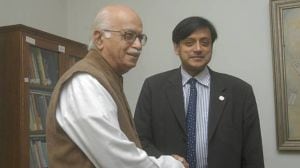P-5 sends a wake-up call to India
GENEVA, June 5: Foreign Ministers of the United States, France, Russia, Britain and China who met here on Thursday pinned a message on the w...

GENEVA, June 5: Foreign Ministers of the United States, France, Russia, Britain and China who met here on Thursday pinned a message on the wall for India to read. It said, “Stop whining and grow up.”
Later in the day, a joint communique was issued calling on both countries to refrain from further tests, join international arms treaties, pledge not to sell this technology and show the responsibility that must come with possessing weapons of mass destruction.
The five have also called Kashmir the “root cause” of tensions between Islamabad and New Delhi, thus pushing the Kashmir issue prominently on to the negotiating table and backing that with very sustained language. In the corridors of negotiations, there was pretty strong language hurled at India.
What is less known is that an early draft of that communique contained language that would have made India see red. Obtained on a privileged basis by The Indian Express, the operative lines on Kashmir read, “The tensions in Kashmir along the Line ofControl are of particular focus and concern.
Ministers urge both parties to avoid threatening movements near the Line of Control, any crossing of the line by security forces, cross border infiltrations or other provocative acts in the region…” Diplomats say it took some doing by Russia to scale that language down. Others say Chinese diplomats who negotiated the draft earlier were also careful about going too strong on Kashmir.
It also provides a glimpse of the nature debate on Kashmir the P-5 must have engaged in. Diplomats this newspaper spoke to said considerable effort was spent discussing ways to reflect the conflict over Kashmir without diluting it. “Russia didn’t want any mention of it the four others found the Russian suggestion absurd,” one diplomat present during the talks said.
China and France expressed some reservations about the language on Kashmir and Britian apparently said it made little sense to ask India and Pakistan to resolve their disputes without mentioningKashmir.
“However, there was extraordinary consensus among the five that this issue must be mentioned and it should not be allowed to drop,” the diplomat added.The G-8 will talk about Kashmir and other issues when they meet in London next week. The P-5 want India and Pakistan to enter into “direct dialogue” on the subject and as for the nuclear question, there are indications that further meetings are planned where Canada, South Africa and Brazil would be included to pressure both India and Pakistan to sign arms pacts.
United States Secretary of State Madeleine Albright who had some very strong words for India told a news conference the aim of the Geneva meeting was “not to make them (India and Pakistan) outcasts or pariahs…we want to engage them, not isolate them.”
Engagement is a two-way process. India have every opportunity now to enter the debate like an adult, without whining and feeling sorry for itself. And whether India likes it or not, wants it or not, the dynamics of this“engagement” have been set in motion. To cope with what is coming, New Delhi might consider:
Primo. Evolving a new language, an entirely new idiom that will convince the world that India is not a war-monger. In reply to a question, Albright said India’s self-declared moratorium and olive branch were not convincing. Bridge that credibility gap, not with stone-age special envoys but with a generation of men and women who understand the new international language, who understand India’s ambitions and own it and who can defend the country’s interests unabashedly in clear and simple language.
Secondo. Stop feeling hurt and isolated. Stop that long whine about how nobody understands this ancient land of the wise and that the best of the country’s intentions are misunderstood by the wicked. Surely New Delhi did not expect the world to sit back and cool its heels while India conducted its nuclear tests. The tests are behind. What next? What are some of the steps India plans to take to show theworld that it’s a responsible nation? What is the sequencing of events that will show the P-5 that India means business? It is not enough to score debating points pointing out the weakness in other countries’ logic, nuclear and otherwise. Show the country’s staying power, intellectual stamina and potential economic might, instead. Indicate what the strategy after the blasts is and engage the world in it.
Tertio. Cutting the tiresome jingoism and posturing. When the world asks how many schools and roads can be built for the price of a bomb have the answers ready and tell that story without shouting. It can be said convincingly. Have the courage of your conviction. Don’t whine.



- 01
- 02
- 03
- 04
- 05




























